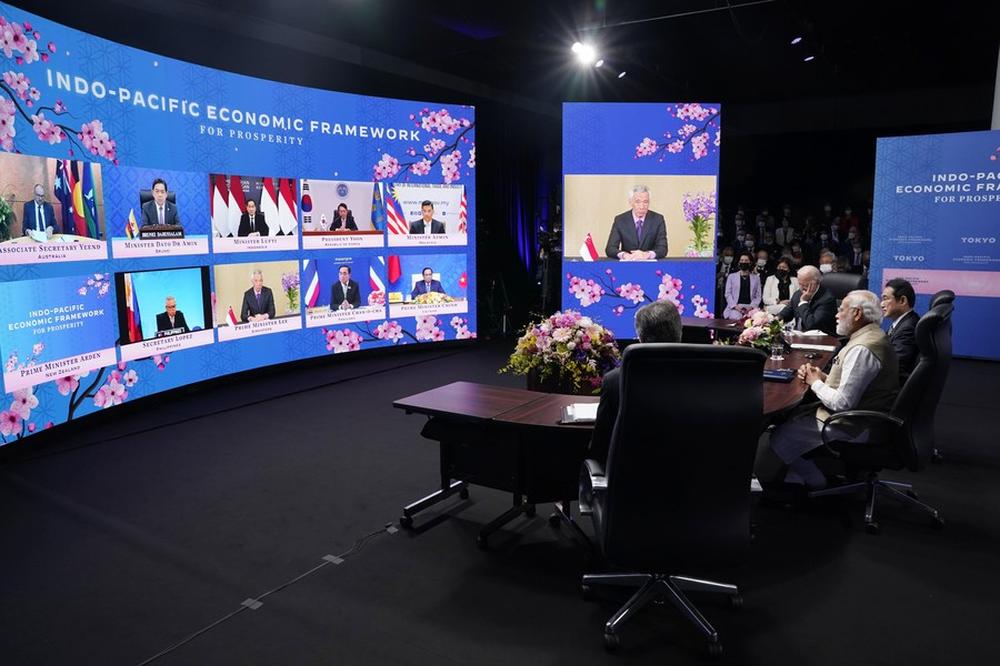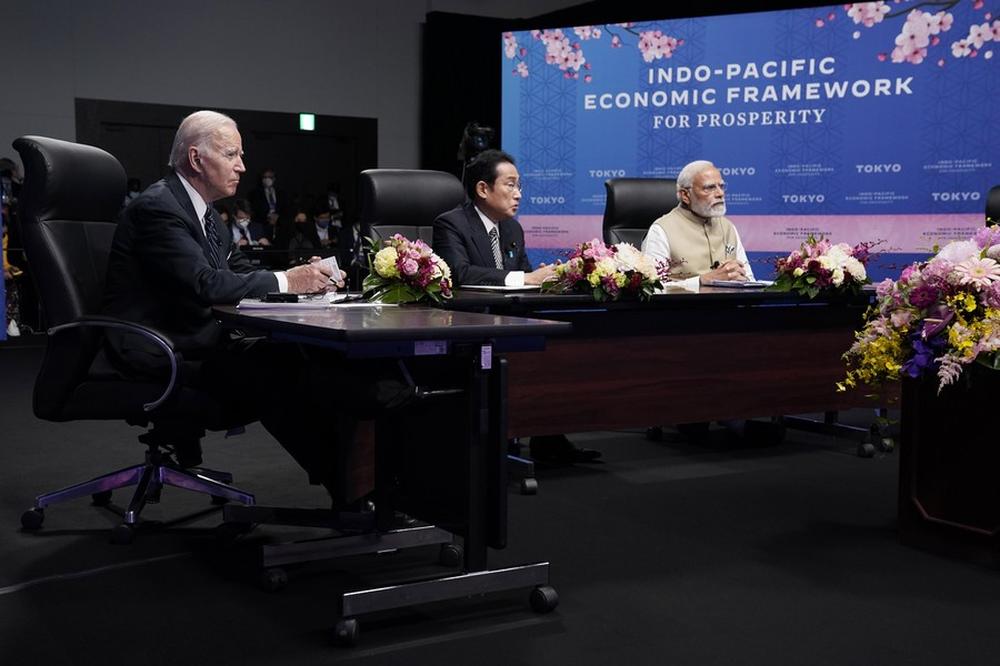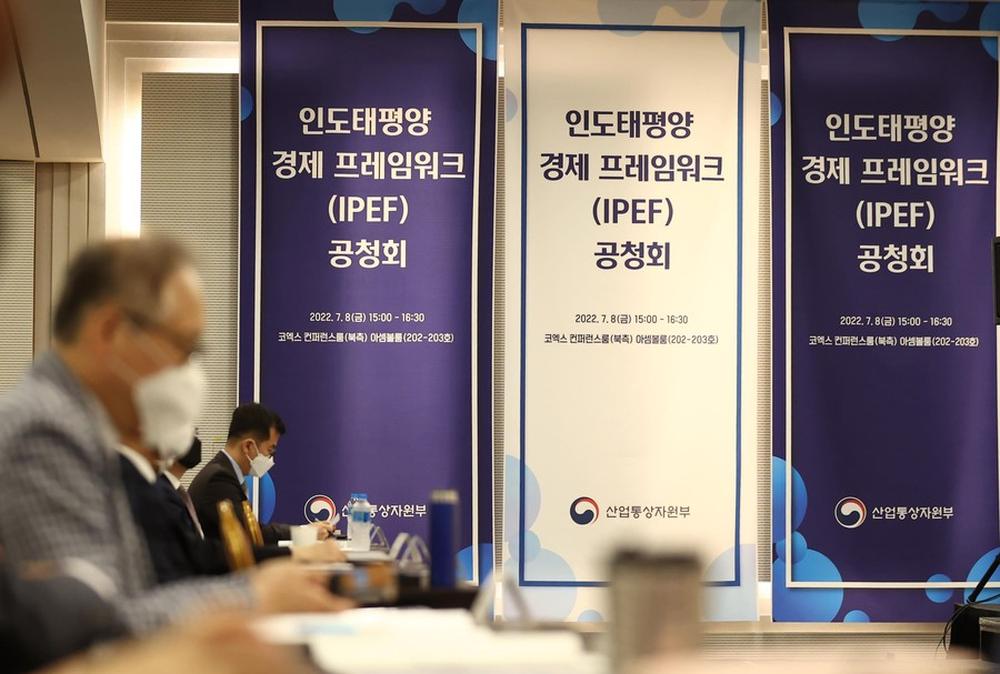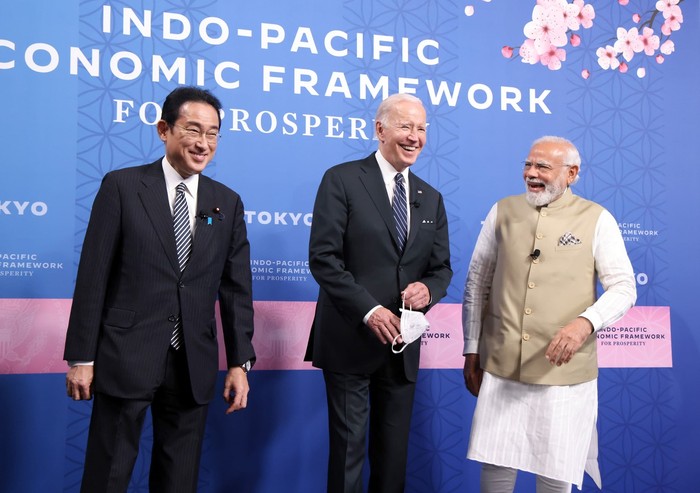- #Economy & Trade
- #Multilateral Relations
- #US Foreign Policy

► The IPEF is not a traditional trade bloc that involves tariffs and market access, but it will be a new vehicle for the U.S. to set the rules for trade in the Indo-Pacific region.
► Although the U.S. holds the key to the participation of ASEAN members, Korea can play a bridge role between the U.S. and ASEAN counterparts in negotiation processes.
► As Korea seeks to enhance its standing in Indo-Pacific and build a reputation as a 'global pivotal state’, playing a part in the success of the IPEF should be prioritized in the new government’s foreign policy.
As the Indo-Pacific Economic Framework (IPEF) was officially launched in May 2022, 14 countries will negotiate the content of the framework by late November 2023, an informal deadline set by the U.S. government. With the high turnout of regional countries, including seven ASEAN member states and India, the IPEF appears to have gotten off the ground. However, it is too early to tell whether the IPEF can fulfill its potential and achieve its intended objectives.
The U.S renewed economic engagement with Indo-Pacific
The IPEF is the Biden administration’s bid to reassert U.S. economic leadership in Asia after former President Donald Trump withdrew from the Trans-Pacific Partnership (TPP) in 2017. The regional countries, particularly Southeast Asia, have long wished to have U.S. leadership back in Asia-Pacific economic architecture, in the hope of securing better access to the U.S. market as well as countering China’s growing influence in the region. President Biden’s announcement of “America is Back” signaled U.S. re-engagement with Indo-Pacific economies, but not enough to rejoin the Comprehensive and Progressive Agreement for Trans-Pacific Partnership (CPTPP), the successor agreement of the TPP. While the CPTPP could have been the easiest option for the U.S. to restore its economic leadership, strong sentiments against multilateral trade deals at home have precluded President Biden from signing up for the CPTPP.
The IPEF is not a traditional trade bloc that involves tariffs and market access, but it will be a new vehicle for the U.S. to set the rules for trade in the Indo-Pacific region. More importantly, by covering timely and critical issues that are most concern to regional countries such as digital economy, emerging technology, supply chain resilience and climate change, the IPEF is expected to provide a new model of economic partnership beyond traditional trade agreements. In particular, IPEP is assumed to accelerate the standards-setting process for digital trade to match the speed of digital economy development in the region. The IPEF also addresses regional challenges posed by the Covid-19 pandemic and worsening climate change.
Questions over the credibility of U.S. commitments
Despite the potential benefits of the IPEF, a question arises of whether U.S. commitments to the IPEF will be sustained after President Biden leaves office. Since the IPEF provides a long-term outlook, policy consistency is key to success. However, the IPEF will take the form of executive agreements which do not require congressional approval. This will make it easier for the U.S. government to enforce the IPEF, but also implies that it can be easily discarded by another executive order made by the new administrations. The reminiscence of President Obama’s strong leadership in concluding the TPP and President Trump’s abrupt withdrawal from it still haunts many regional countries. Negotiations among founding members of the IPEF are known to be finalized ahead of APEC summit in November 2023, meaning that the first Biden administration is likely to have about one year to implement the IPEF. Without rules bound by a formal legislative approval, regional partners cannot rule out the possibility that U.S leadership change may lead to the loss of momentum of the IPEF or the replacement by other cooperation frameworks.
The uncertainty of participation of ASEAN countries
The participation of seven ASEAN member states was a significant win for the U.S. Given that the U.S. proposal does not provide lower tariffs and better market access, there had been widespread skepticism over the participation of ASEAN states, except Singapore. A possible backlash from China was another reason to give them pause to join the U.S.-led new pact. Nevertheless, seven ASEAN countries seem to have signed up for the IPEF as a sign to support U.S. re-engagement with the region, both for increasing economic contact with the U.S. and balancing China’s growing clout in the region. Of course, Washington made considerable efforts to persuade ASEAN states to get on board. Right before the launch of the IPEF, President Biden invited ASEAN leaders to Washington and held the ASEAN-U.S. Special Summit (12-13 May 2022). A modular approach offered by the U.S. to allow participants to negotiate selected pillars separately also appears to have lowered the barriers.
The high turnout of ASEAN states has allowed the IPEF to be a ‘multilateral’ partnership as planned, not an exclusive group consisting of close U.S. allies and partners only. However, it is uncertain whether all ASEAN participants will be on the final membership list. While Singapore, the Philippines, and Malaysia showed their interest in being members of the IPEF, Thailand, Vietnam, and Indonesia made it clear that they will take a ‘wait and see’ approach. This hinted that these countries may pull the plug on negotiations if the details of the proposal do not live up to their expectations. The majority of ASEAN participants are likely to negotiate the ‘supply chain’ pillar in seeking to increase their participation in the global value chain (GVC) and reduce their economic dependence on China – albeit in ways that do not antagonize Beijing directly. They will also participate in the ‘clean energy and infrastructure pillar with the expectation that advanced countries would provide financial and technical assistance to address climate change and infrastructure shortages. However, most ASEAN members may not be able to bear high standard rules in the fields of the digital economy, labor, and environment, corporate accountability, and anti-corruption. The participation of ASEAN states in the ‘trade’ and ‘tax and anti-corruption pillars, therefore, depends on whether the U.S. provides sufficient incentives to offset the costs of complying with high standard rules.
Implications for South Korea
As a firm supporter of the multilateral trading system, South Korea’s membership in the IPEF is not surprising. Since the IPEF covers digital trade, decarbonization, and supply chains - all of which are critical concerns of Korea’s economy -, Seoul needs to proactively participate in rule-making processes for emerging trade issues. In particular, given that the digital economy is to be Korea’s new growth engine, Korea has to make extra efforts to reflect its interests in negotiations for digital trade. With a competitive edge in the high-tech industry, Korea is expected to play a key role in reshaping supply chain networks. The participation in the ‘supply chain’ pillar provides good opportunities for Korea to diversify its economy from China, but a careful and strategic approach is needed along with close dialogues with the business community. Most importantly, it should be made clear that Korea’s involvement in the IPEF is not meant to counter China but is part of its efforts to increase the country’s presence in the Indo-Pacific.
Indeed, the IPEF can be a new tool for Korea to expand its engagement with Southeast Asian economies. Over the past four years, Korea has strived to strengthen its economic ties with ASEAN under the New Southern Policy. High standards and norms negotiated under the IPEF will help boost trade and investment between Korea and its ASEAN counterparts. In addition, the ‘clean energy and infrastructure' pillar can provide a new platform for Korea to engage with climate change and infrastructure cooperation in Southeast Asia. For these potentials to be realized, the high level of participation by ASEAN members should be ensured. Although the U.S. holds the key to the participation of ASEAN members, Korea can play a bridge role between the U.S. and ASEAN counterparts in negotiation processes. Furthermore, building upon the well-established ASEAN-Korea supply chain networks, Korea has to come up with a strategy to more integrate ASEAN partners into Korea’s manufacturing supply chains under the IPEF.
Despite the uncertainty over the outcome, the IPEF is still a useful platform to address key economic challenges in the region and further strengthen ASEAN-Korea economic partnership. As Korea seeks to enhance its standing in Indo-Pacific and build a reputation as a ‘global pivotal state’, playing a part in the success of the IPEF should be prioritized in the new government’s foreign policy.


